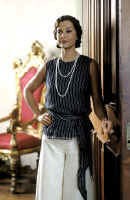By: debbie lynn elias

Anyone that knows me or my work, knows my passion for the movie musical. So, it should come as no surprise that this week I turn my attention to “De-Lovely” – a musical biography of one of forefathers of the American musical, – Cole Porter. Some of you may remember the 1946 Cary Grant classic “Night and Day” which, while extremely enjoyable and entertaining, was fictionalized to accommodate the accepted morals of the day; in other words, Cary Grant did not play Cole Porter as a homosexual (nor was the story written as such). With “De-Lovely”, screenwriter Jay Cocks and director Irwin Winkler, bring an honesty and emotion to the screen by depicting Porter as the man he was – a homosexual with passion, a man with flaws, a man with a lifelong love for his wife Linda, a romantic, and a songwriter extraordinaire who turned his own passions, pains, loves and losses into some of the most prolific, memorable and touching songs of our time; classics that still speak to some part of each of us.
Our story begins with an aging Cole Porter journeying back through time thanks to an ethereal, god-like being named Gabe. We are transported to 1919, and a 20-something Cole is in Paris, living the high life with the likes of Hemingway and the Fitzgeralds. Born with money, Cole spent it lavishly, and never moreso than when meeting the woman who is to be the love of his life. Despite the fact that he is gay, Cole is mesmerized by the lovely Linda Lee. They quickly marry, with Linda accepting the fact that Cole is more attracted to men than even she is, but also realizing that the love shared by the two of them is something deeply heartfelt and unconditional. At ease with each other and life, they live hard, live fast and face devastating losses – most notably, an injury suffered by Porter that left him in pain for the last 27 years of his life. (Although you would never know the depth of his pain or the tragedy to hear his songs!) But despite the heartache, Cole’s star rises ever higher and the love between Cole and Linda endures and in some respects grows even stronger due to their shared compassion and forms of self-imposed solitude and lifestyle.
Kevin Kline and Ashley Judd take center stage as Cole and Linda Porter. Let’s face it – they are the story. Anyone else is merely window dressing. Kline is mesmerizing as Porter, bringing a humanizing edge to the man that shows his inner character, genius and talent despite, or in spite of, his flawed shortcomings. When it came to his talent, Porter was known (to the chagrin of many of his friends, like fellow songwriter, Irving Berlin) for being able to sit down and effortlessly compose the perfect song. Here, Kline portrays that gift with a genuine ease and affability that softens the long rumored Hollywood tales of mild jealousy among Porter’s colleagues. Kline brings such an honest sincerity and charm to the man that one can’t help but feel compassion for him and let’s face it – like him. Giving even more credence to the performance is the fact that Kline does play the piano and actually is playing in the scenes calling for it.
And as for Ashley Judd, I am at a loss for words when it comes to describing her talent, particularly with her performance as Linda Lee. Poignant, bewitching, beguiling, astonishing, amazing, effective and unaffected, are only the tip of the iceberg. Having watched her from the beginnings of her career on television’s “Sisters” through thrillers like “Double Jeopardy” and “High Crimes” to heartfelt works such as “Where the Heart Is” or “Divine Secrets of the Ya-Ya Sisterhood” or comedies in the vein of “Someone Like You”, all I can say is this – Is there nothing this woman can’t do?! Here, she oozes emotion with every nuance, every look, every word and nails the very essence of Linda Lee to the point of making the viewer feel along with her. And talk about the chemistry between Kline and Judd! Cinergistic. Symbiotic. Flawless.
Directed by Irwin Winkler, the move is told through flashbacks as Porter and Gabe silently watch rehearsals of a musical based on Porter’s life. An oft over-used and tired format, Winkler breathes new life into the well-worn thanks to a superlative dialogue by Jay Cocks and the performances of Judd and Kline. Sadly, however, the one area that is lacking is the shooting of musical numbers. Not known for musical direction, Winkler short changes both the audience and the source material with rigid and uneven depictions of some Porter classics.
This film is magical. I guarantee that many of you are Cole Porter fans without realizing it. His songs have stood the test of time and will do so long into the 21st century and even beyond. Throw away the story. Throw away the superb acting. Throw away the script. It’s still magic. If for no other reason, “De-Lovely” is a film to be savored like a fine wine just for the songbook it contains. The music is eloquently timeless. The lyrics unparalleled, even illuminating. Yes, it’s delightful, it’s delicious, it’s delectable…it’s “De-Lovely.”
Cole Porter: Kevin Kline Linda Lee Porter: Ashley Judd Gabe: Jonathan Pryce Irving Berlin: Keith Allen
Directed by Irwin Winkler. Written by Jay Cocks. Music and lyrics by Cole Porter. A Metro-Goldwyn Mayer film. Rated PG-13. (125 min)











